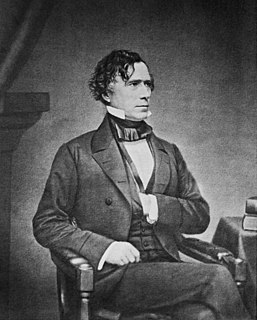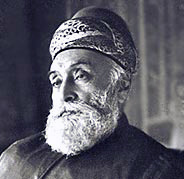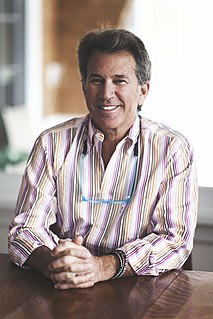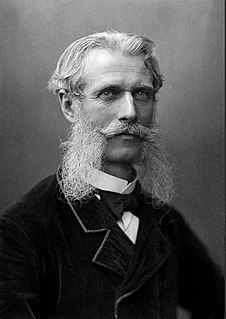Top 323 Philanthropy Quotes & Sayings - Page 6
Explore popular Philanthropy quotes.
Last updated on November 18, 2024.
The constitutionality and propriety of the Federal Government assuming to enter into a novel and vast field of legislation, namely, that of providing for the care and support of all those ... who by any form of calamity become fit objects of public philanthropy. ... I cannot find any authority in the Constitution for making the Federal Government the great almoner of public charity throughout the United States. To do so would, in my judgment, be contrary to the letter and spirit of the Constitution and subversive of the whole theory upon which the Union of these States is founded.
Aside from higher considerations, charity often operates as a vastly wise and prudent principle-a great safeguard to its possessor. Men have committed murder for jealousy's sake, and anger's sake, and hatred's sake, and selfishness' sake, and spiritual pride's sake; but no man that ever I heard of, ever committed a diabolical murder for sweet charity's sake. Mere self-interest, then, if no better motive can be enlisted, should, especially with high-tempered men, prompt all beings to charity and philanthropy.
There is one kind of charity common enough among us... It is that patchwork philanthropy which clothes the ragged, feeds the poor, and heals the sick. I am far from decrying the noble spirit which seeks to help a poor or suffering fellow being... [However] what advances a nation or a community is not so much to prop up its weakest and most helpless members, but to lift up the best and the most gifted, so as to make them of the greatest service to the country.
The Girl Scouts is where I became acquainted with the idea that a woman can do anything. Learning that early on has a tremendous impact on the development of a young girl's personality. It had a huge impact on me. Girl Scouts is where I first learned about philanthropy and fell in love with the concept of helping others-in my troop this was very important. We did a lot of community service like picking up trash and feeding the homeless. Loving humankind was something that echoed throughout my time at Girl Scouts.
In view of the importance of philanthropy in our society, it is surprising that so little attention has been given to it by economic or social theorists. In economic theory, especially, the subject is almost completely ignored. This is not, I think, because economists regard mankind as basically selfish or even because economic man is supposed to act only in his self-interest; it is rather because economics has essentially grown up around the phenomenon of exchange and its theoretical structure rests heavily on this process.
I’ve seen how important this concept is in business. To be truly successful, companies need to have a corporate mission that is bigger than making a profit. We try to follow that at salesforce.com, where we give 1% of our equity, 1% of our profits, and 1% of our employees’ time to the community. By integrating philanthropy into our business model our employees feel that they do much more than just work at our company. By sharing a common and important mission, we are united and focused, and have found a secret weapon that ensures we always win.
I also think that employees these days expect less of a separation of work and personal life. That doesn't mean that work tasks should encroach upon our personal time, but it does mean that employees today expect more from the companies for whom they work. Why shouldn't your workplace reflect your values? Why is "giving back" not a part of our jobs? The answer for us is to integrate philanthropy with work.
In order to learn how to do something well, you have to fail sometimes. In order to fail, there has to be a measurement system. And that's the problem with most philanthropy - there's no measurement system. You give somebody some money to do something and most of the time you can really never measure whether you failed or succeeded in your judgment of that person or his ideas or their implementation.
As I see it, there are two great forces of human nature: self-interest, and caring for others. Capitalism harnesses self-interest in a helpful and sustainable way, but only on behalf of those who can pay. Government aid and philanthropy channel our caring for those who can't pay. But to provide rapid improvement for the poor we need a system that draws in innovators and businesses in a far better way than we do today.
Perhaps the perusal of such works may, without injustice, be compared with the use of opiates, baneful, when habitually and constantly resorted to, but of most blessed power in those moments of pain and of langour, when the whole head is sore, and the whole heart sick. If those who rail indiscriminately at this species of composition, were to consider the quantity of actual pleasure it produces, and the much greater proportion of real sorrow and distress which it alleviates, their philanthropy ought to moderate their critical pride, or religious intolerance.
Doing for people what they can and ought to do for themselves is a dangerous experiment. In the last analysis, the welfare of the workers depends upon their own initiative. Whatever is done under the guise of philanthropy or social morality which in any way lessens initiative is the greatest crime that can be committed against the toilers. Let social busybodies and professional "public morals experts" in their fads reflect upon the perils they rashly invite under this pretense of social welfare.
God never estimates what we give from impulse. We are given credit for what we determine in our hearts to give; for the giving that is governed by a fixed determination. The Spirit of God revolutionises our philanthropic instincts. Much of our philanthropy is simply the impulse to save ourselves an uncomfortable feeling. The Spirit of God alters all that. As saints our attitude towards giving is that we give for Jesus Christ's sake, and from no other motive.
Compassionate Saviour! We welcome Thee to our world, We welcome Thee to our hearts. We bless Thee for the Divine goodness Thou hast brought from heaven; for the souls Thou hast warmed with love to man, and lifted up in love to God; for the efforts of divine philanthropy which Thou hast inspired; and for that hope of a pure celestial life, through which Thy disciples triumph over death.
What does the world need that you can provide?”?Express your social mission, whether it’s cause marketing, volunteering, culture, environmental initiatives, sustainable products, or corporate philanthropy?Start before scale: make a commitment, take small steps and then scale when you’re ready?Internalize and share your social mission?Be unfailingly transparent – “If you’re not scared by what you’re saying, you’re not sharing enough
His words even imply that philanthropy has deeper depths than is generally realized. The great emotions of compassion and mercy are traced to Him; there is more to human deeds than the doers are aware. He identified every act of kindness as an expression of sympathy with Himself. All kindnesses are either done explicitly or implicitly in His name, or they are refused explicitly or implicitly in His name.
The merchant must be no more pessimist than optimist, since pessimism induces him to hold back his capital but optimism induces him to take such risks that he has more to tear than to hope. Abu al'Fadl Ja'far al-Dimishqi (c. 9th century) Arab writer. The Beauties of Commerce Business pays ... philanthropy begs.
How can the physique be braced if no fresh breath from the outer world is suffered to permeate the languid, enervating air of thedrawing-room? How can the grasp of the mind be vigorous, without action? Daughters of inherited wealth, or accumulated labor! the wide door of philanthropy is open peculiarly to you! Your life-work lies beyond your threshold: your wealth has placed you above the sorrowful struggle for daily bread which takes up the whole time of so many of your brothers and sisters. You are the almoners of God. A double accountability is yours.
I do think that people have an obligation to give back but that doesn't necessarily mean that you give back just the traditional way. Maybe there's new ways to give back and make a contribution. I'm looking forward to some mix of philanthropy - maybe through a somewhat different prism - as well as helping entrepreneurs build some significant new businesses.
In the philanthropy game, you're going for different outcomes: saving childhood lives, having kids grow up - because they don't have malnutrition or disease - that they achieve their full potential. We take for Warren [Buffett] things that, because he's very intelligent about the world but doesn't get to go out in Africa and see what we see, we've taken and say to him where we stand and it's basically a very positive report that his gift has made a phenomenal difference.
I've spent so much time with my dad traveling and seeing the ground-level change that we've been able to make through philanthropy and trip over trip, time over time, country over country, home after home we've been invited into, given tea, given food that people didn't have to give us, I mean all of these things.
I know nothing of philosophical philanthropy. But I know what I have seen, and what I have looked in the face in this world here, where I find myself. And I tell you this, my friend, that there are people (men and women both, unfortunately) who have no good in them-none. That there are people whom it is necessary to detest without compromise. That there are people who must be dealt with as enemies of the human race. That there are people who have no human heart, and who must be crushed like savage beasts and cleared out of the way.
The paths by which people journey toward happiness lie in part through the world about them and in part through the experience of their souls. On the one hand, there is the happiness which comes from wealth, honor, the enjoyment of life, from health, culture, science, or art; and, on the other hand, there is the happiness which is to be found in a good conscience, in virtue, work, philanthropy, religion, devotion to great ideas and great deeds.




















